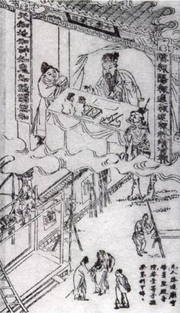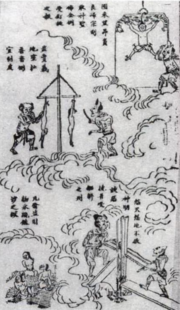
Jade Record
Encyclopedia

China
Chinese civilization may refer to:* China for more general discussion of the country.* Chinese culture* Greater China, the transnational community of ethnic Chinese.* History of China* Sinosphere, the area historically affected by Chinese culture...
. It has some folk-Buddhist
Buddhism
Buddhism is a religion and philosophy encompassing a variety of traditions, beliefs and practices, largely based on teachings attributed to Siddhartha Gautama, commonly known as the Buddha . The Buddha lived and taught in the northeastern Indian subcontinent some time between the 6th and 4th...
and Daoist features and describes the horrors of Diyu (hell
Hell
In many religious traditions, a hell is a place of suffering and punishment in the afterlife. Religions with a linear divine history often depict hells as endless. Religions with a cyclic history often depict a hell as an intermediary period between incarnations...
in Chinese mythology) that await bad people.
The prologue states that the tract was submitted to the Jade Emperor
Jade Emperor
The Jade Emperor in Chinese folk culture, is the ruler of Heaven and all realms of existence below including that of Man and Hell, according to a version of Taoist mythology. He is one of the most important gods of the Chinese traditional religion pantheon...
or Highest God by the king of hell Yan Luo
Yama (Buddhism and Chinese mythology)
Yama the name of the Buddhist dharmapala and judge of the dead, who presides over the Buddhist Narakas , "Hells" or "Purgatories". Although ultimately based on the god Yama of the Hindu Vedas, the Buddhist Yama has developed different myths and different functions from the Hindu deity...
and the Bodhisattva of Compassion, then passed down to a Buddhist priest and on to a Taoist, during the Song Dynasty
Song Dynasty
The Song Dynasty was a ruling dynasty in China between 960 and 1279; it succeeded the Five Dynasties and Ten Kingdoms Period, and was followed by the Yuan Dynasty. It was the first government in world history to issue banknotes or paper money, and the first Chinese government to establish a...
.
The tract describes how the dead pass through the ten courts of hell and are punished with terrible torture according to their misdeeds during life. In the first hall, the "Mirror of Reflection" lets the dead see their own sins. Sins specifically mentioned include: mocking or disbelieving the tract itself, taking one's life without good reason, having weak faith in the Buddha
Gautama Buddha
Siddhārtha Gautama was a spiritual teacher from the Indian subcontinent, on whose teachings Buddhism was founded. In most Buddhist traditions, he is regarded as the Supreme Buddha Siddhārtha Gautama (Sanskrit: सिद्धार्थ गौतम; Pali: Siddhattha Gotama) was a spiritual teacher from the Indian...
, being careless as Buddhist or Taoist priest, killing live creatures, stealing, cheating, gambling, drinking, drowning baby girls, killing slaves etc. Yan Luo himself rules over the fifth court of hell; the Highest God demoted him from the first court because he proved too compassionate towards murder victims, allowing them to return to the world for another life. Yan Luo also built a "Tower to View the World", from which the dead can observe how their relatives curse their memory and fight over their possessions. At the end of their passage through hell, the souls are made to forget their previous lives in the goddess Meng
Meng Po
Meng Po is the Lady of Forgetfulness in Chinese mythology.Literally means Old Lady Meng, Meng Po serves in Diyu, the Chinese realm of the dead...
's "Tower of Forgetting" and are sent back to the world, reincarnated as animals, poor, ill or ugly humans, or as rich men, depending on their prior behavior.
The Jade Record also contains a calendar, devoting the first day of the first lunar month
Chinese calendar
The Chinese calendar is a lunisolar calendar, incorporating elements of a lunar calendar with those of a solar calendar. It is not exclusive to China, but followed by many other Asian cultures as well...
to Maitreya Buddha
Maitreya
Maitreya , Metteyya , or Jampa , is foretold as a future Buddha of this world in Buddhist eschatology. In some Buddhist literature, such as the Amitabha Sutra and the Lotus Sutra, he or she is referred to as Ajita Bodhisattva.Maitreya is a bodhisattva who in the Buddhist tradition is to appear on...
, the eighth day to Yan Luo, the ninth to the Jade Emperor. The Sakyamuni Buddha
Gautama Buddha
Siddhārtha Gautama was a spiritual teacher from the Indian subcontinent, on whose teachings Buddhism was founded. In most Buddhist traditions, he is regarded as the Supreme Buddha Siddhārtha Gautama (Sanskrit: सिद्धार्थ गौतम; Pali: Siddhattha Gotama) was a spiritual teacher from the Indian...
, the Boddhisattva of Compassion, and the Kitchen God
Kitchen God
In Chinese folk religion and Chinese mythology, the Kitchen God, named Zao Jun or Zao Shen , is the most important of a plethora of Chinese domestic gods that protect the hearth and family with the addition of being celebrated...
receive two days each. Numerous other gods also receive their special day.

Qing Dynasty
The Qing Dynasty was the last dynasty of China, ruling from 1644 to 1912 with a brief, abortive restoration in 1917. It was preceded by the Ming Dynasty and followed by the Republic of China....
emperors tried to suppress the tracts, as the state religion Confucianism
Confucianism
Confucianism is a Chinese ethical and philosophical system developed from the teachings of the Chinese philosopher Confucius . Confucianism originated as an "ethical-sociopolitical teaching" during the Spring and Autumn Period, but later developed metaphysical and cosmological elements in the Han...
discouraged any speculation about the afterlife. Hong Xiuquan
Hong Xiuquan
Hong Xiuquan , born Hong Renkun, style name Huoxiu , was a Hakka Chinese who led the Taiping Rebellion against the Qing Dynasty, establishing the Taiping Heavenly Kingdom over varying portions of southern China, with himself as the "Heavenly King" and self-proclaimed brother of Jesus Christ.-Early...
, the quasi-Christian leader of the Taiping Rebellion
Taiping Rebellion
The Taiping Rebellion was a widespread civil war in southern China from 1850 to 1864, led by heterodox Christian convert Hong Xiuquan, who, having received visions, maintained that he was the younger brother of Jesus Christ, against the ruling Manchu-led Qing Dynasty...
, forbade the tracts once he had risen to power.

